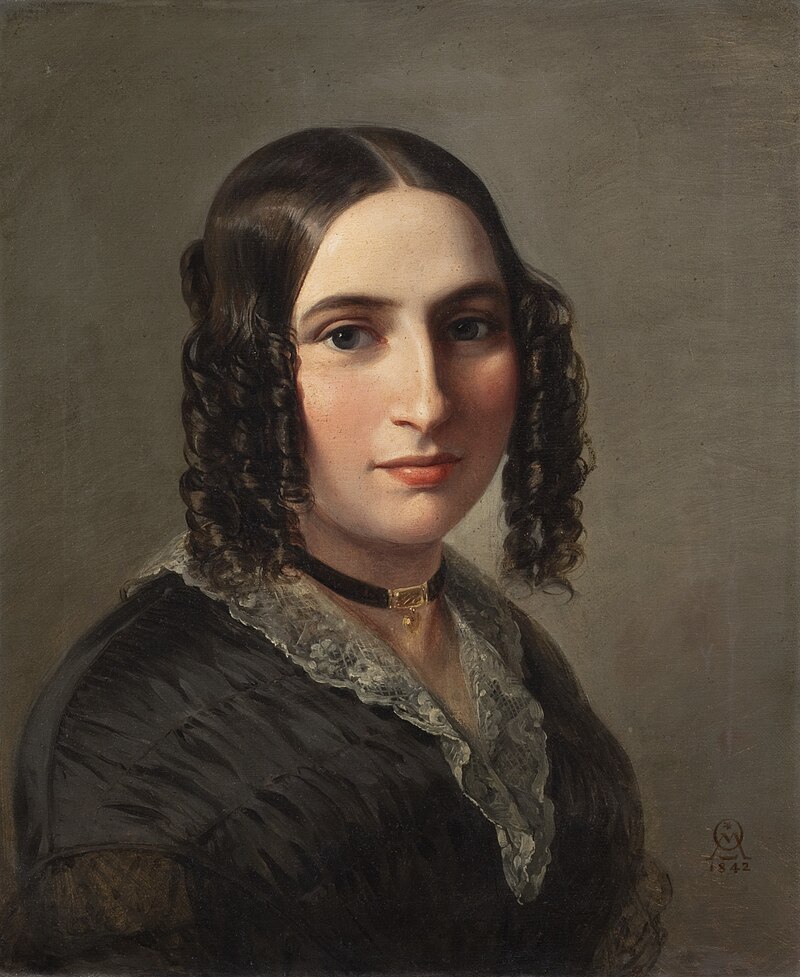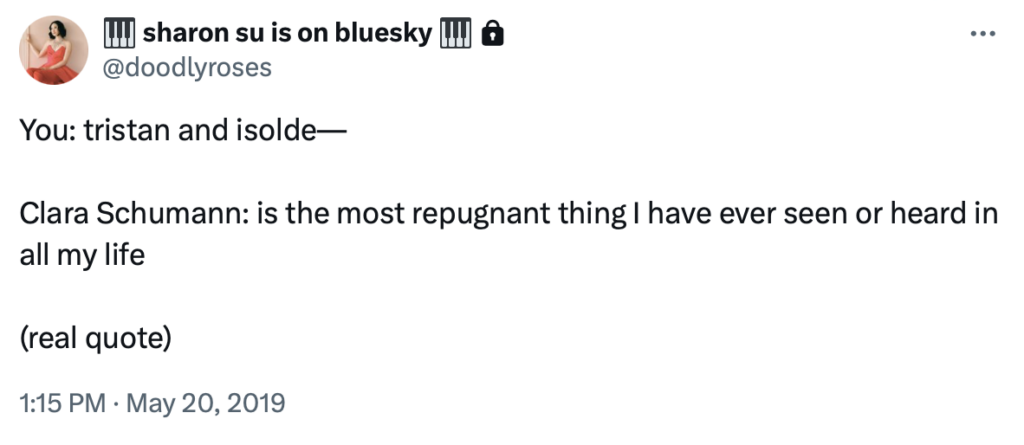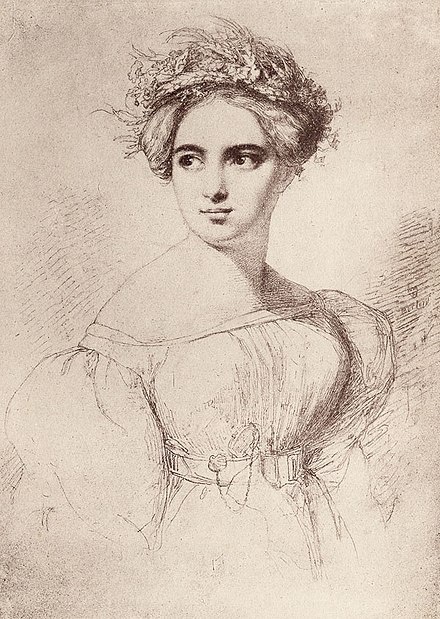Note: This is a centralized, formatted version of a Twitter thread I wrote. I have turned it into a blog post for easier reading and sharing.
First posted on Twitter on November 14, 2019. I am unable to link to the original because I have locked down my Twitter and am no longer active on the platform.

Okay! Let’s talk about Fanny Mendelssohn Hensel, born on this day, November 14. (I refer to her as “Fanny Mendelssohn Hensel” because even though she went by “Fanny Hensel” after marriage, history has made the Mendelssohn name more recognizable, and so using both surnames is how I personally split the difference to make it clear who I’m talking about. )
It’s hard to talk about Fanny without also talking about her brother Felix (guy who wrote Midsummer Night’s Dream, Songs Without Words, that octet, some banging piano concertos) because their fame and creative outputs were so intertwined. They were both gifted child prodigies, often compared to history’s other famous brother-sister duo Wolfgang and Nannerl Mozart (except with a much less crappy dad).
Fanny had perfect pitch (of course), could play all 24 preludes from Bach’s Well-Tempered Clavier from memory at age 13 (why not), and was regarded by some teachers/friends as being more gifted than her brother Felix (girl was talented AS HELL).
She was also funny AF, here are excerpts from her letters in which 1) she is super relatable and 2) dunks on Berlioz:


And one of my favorite Fanny stories is the time Queen Victoria invited Felix to Buckingham Palace, told him how much she loved his work, and it turns out it was actually Fanny’s:
Queen Victoria: thanks for coming, I’m a big fan of your music
Felix Mendelssohn: wow no thank you, it’s an honor, love the british empire
Queen Victoria: I particularly love “Italien,” it’s just amazing
Felix Mendelssohn: oh. um…actually my sister wrote that
Felix Mendelssohn: you’re still a fan of me, right
In a lot of the narratives about women composers, there are two tropes: either they were 100% discouraged from pursuing music at all, or they bucked all the trends and did what they wanted. Fanny’s story is…a lot more complex than that.
Her family was super musical! She was encouraged to compose! She collaborated with her brother! Everyone talked about how talented she was! For a composer in the 1800s that was a great situation…EXCEPT for the little tiny fact that she was discouraged from going pro. As Anna Beer points out, part of it was a class thing: the Mendelssohn family was wealthy and it was not a good look for their daughter to pimp out her talents for money.
Also they were Jewish in 1800s Germany and that was a whole thing.

(The Mendelssohns eventually converted to Christianity and adopted the surname “Bartholdy” which is why you sometimes see Felix referred to as “Felix Mendelssohn Bartholdy.” The more you know!)
Very luckily for Fanny (and for us), marriage did not put an end to her composing bc she married the Ben Wyatt of Prussian dudes: Wilhelm Hensel, an artist who insisted she keep composing, and later (spoiler alert) encouraged her to publish her music. (This is super special because historically a lot of women had to stop composing when they got married. See: Alma Mahler, Nannerl Mozart, and even my girl Clara Schumann got some of that splashback.)
The Mendelssohn family actually didn’t think Wilhelm was all that great when he first showed up so they told him to bug off to Rome for 5 years (he did) and not to write letters to Fanny (so he sent drawings instead). When they got married Fanny wrote her own goddamn wedding music JUST BECAUSE SHE COULD (and also Pachelbel’s canon is overrated).
Throughout their lives, Felix and Fanny’s creative processes were highly collaborative: they bounced ideas off each other, edited each other’s music, and quoted each other’s melodies in their own compositions. IT IS VERY IMPORTANT TO ME THAT YOU KNOW THIS because: a lot of people talk about Fanny’s music in the context of Felix’s (hell I’m doing that right now) but we still study Felix’s music like it was created in a vacuum AND THAT’S NOT OKAY. This woman wrote 460+ pieces of music! Her Wikipedia list of compositions is longer than a freaking CVS receipt! How people handwave the influence of a major composer in the family is beyond me.
So she wasn’t supposed to perform, conduct, or compose outside of the home. For most people this is where their career goes to die, but Fanny Mendelssohn Hensel was not most people. She solved the problem by just opening up her goddamn home.
The Mendelssohn family lived in this massive mansion (look I’m not gonna lie to you, it helps to be rich) so Fanny started hosting these musical gatherings at her house that ended up being the hottest tickets in Berlin. These events were the real deal! There were rehearsals, full audiences, and official printed programs! It was the first stop for any international artist hoping to make it in Germany. Franz Freaking Liszt was in frequent attendance because Fanny RAN THIS TOWN.
She even had a higher standard of etiquette than most concert halls. She required that the audience remain quiet during performances (which was not common at the time, people were used to eating and drinking and gossiping throughout concerts).
She was also a major figure in the Clara Schumann Cinematic Universe: the Mendelssohns were close friends with the Schumanns, although Clara once said Fanny had a “rather brusque manner” which is rich coming from the woman who once said this:

Anyway Fanny gained a LOT of musical power and influence this way, although there’s no sugarcoating it: she did the best with what she had and was still closed off from the public musical life her brother got to live. AND she had to work with a lot of amateurs:

So after decades of writing music (song cycles! choral works! a symphonic overture! sonatas! a massive piano work that defies labels!) she finally plucked up the courage to say “f the system” and publish her music under her own name. I say “under her own name” because previously she worked with Felix to publish some of her music under HIS name, which is what led to the whole Queen Victoria debacle.
At the age of 40, she published her Opus 1 in her own name. She wrote, “I feel as if newly born.” It was a new chapter in her life, the start of a long, brilliant career as a great composer—
Sorry, my Fanny Mendelssohn Alternate Timeline script got away from me there. She had a stroke while rehearsing a new piece of music and died at age 41.
I’M STILL HEARTBROKEN OVER THIS.
(And so was Felix, who died six months later.)
The fact that she (and one of her only professional advocates) died so young, the overwhelming sentiment that women couldn’t compose, the rise of anti-Semitism: all these contributed to the burying of Fanny Mendelssohn Hensel’s legacy.
So on this day, her birthday, I invite you to give her music a listen.
Here’s her Piano Trio Op. 11, one of her few published works:
Here’s “Italien,” the song that Queen Victoria liked so much:
Here’s a Spotify playlist of her music:
And an Apple Music playlist of her music.
Happy birthday Fanny, we still don’t deserve you.
P.S. This is a portrait of Fanny, as drawn by her husband 💕

2024 P.P.S. Since writing this thread, there have been many fun new developments in Hensel Land!
First of all, an amazing internet friend launched Hensel Pushers, an online archive that provides all of Fanny Mendelssohn Hensel’s existing music for free. This is an enormous endeavor, because the single person behind it often has to go through old, hard-to-read manuscripts and make digital engravings note by note; the fact that it’s free is mind-boggling. I do encourage you to donate to Hensel Pushers, and check out their store. (As of this week, Hensel Pushers launched their four-hands arrangement of Fanny’s magnum opus, Das Jahr.)
Second of all, I did a super special, holy-crap-I-still-can’t-believe-it project: another internet friend, Patricia Wallinga, arranged a piano concerto based on Fanny’s Sonata in G Minor, and I got to premiere it with the Ballets Russes Arts Initiative in Boston in 2023. There’s more info about it on the projects page of my website, and you can watch a mini-doc of the project:
Further Reading
Books About Fanny Mendelssohn Hensel
The Other Mendelssohn, by R. Larry Todd
Sounds and Sweet Airs, by Anna Beer
Articles
“The Rediscovery of Fanny Mendelssohn” by Elizabeth Winkler, Wall Street Journal
Documentary
Fanny: The Other Mendelssohn, directed by Sheila Hayman (direct descendent of Fanny Mendelssohn Hensel)
More in This Series
If you enjoyed this post, please consider subscribing to my newsletter! My writing on music (and other things) will land in your inbox roughly once every two weeks, and while it’s free, paid subscriptions enable me to make studio recordings of music by underrepresented composers!
Leave a Reply